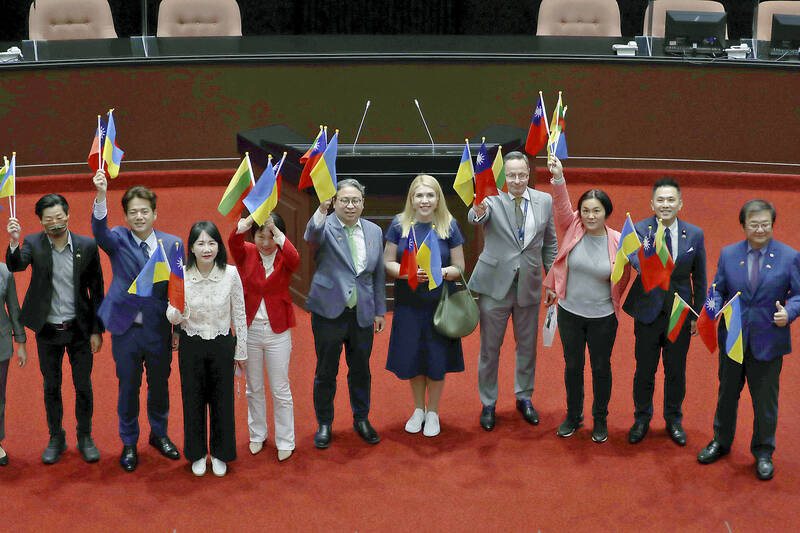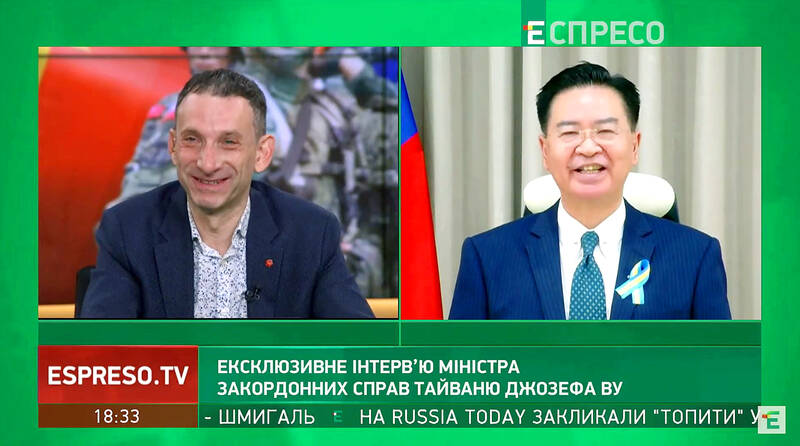Ukrainian lawmaker Kira Rudik on Monday thanked Taiwan for its support of Ukraine and said she hoped to learn from Taiwan’s advanced security systems to combat Russian cyberattacks.
“Right now, Ukraine is at the forefront of that [fight for survival and democracy] and we need everybody as our allies,” Rudik, leader of the Holos party, said in an online interview. “And this is why it is so important to acknowledge the support that Taiwan was giving to Ukraine, and the support is increasing and I want to extend my gratefulness for that.”
Rudik, who is in Taipei to attend the 11th Global Assembly of the World Movement for Democracy, said that Taiwan is now perceived as a Ukraine ally and, like Ukraine, is fighting for its freedom.

Photo: Chiang Ying-ying, AP
Ukrainians have received good wishes from Taiwan and saw video clips of solidarity demonstrations in Taiwan she said, adding that “this is very important to us.”
Since Russia invaded Ukraine on Feb. 24, Taipei has joined global democracies in condemning Moscow, implementing sanctions against Russia and aiding Ukraine.
Rudik, who serves on her parliament’s Committee on Digital Transformation, said in the interview that beyond attending the assembly, she also hoped to learn from Taiwan’s advanced cybersecurity systems and its experience in combating cyberattacks.

Photo: Screen grab from Espreso TV by Lu Yi-hsuan, Taipei Times
Ukraine is moving forward with developing its own systems to support its troops, and she was interested in discussing digital transformation with representatives of the digital world in Taipei, she said.
Asked what advice she has for Taiwan as it faces military coercion from another authoritarian regime, Rudik said Ukrainians have learned to stay united, find allies wherever possible and beware of cognitive warfare.
No one knew Russian President Vladimir Putin was going to invade Ukraine so quickly, or Kyiv would have built more bomb shelters and taught people how to use them in advance to save more lives, she said.
“So we’re learning it now, but we’re learning it the hard way,” she said.
Asked if Taiwan’s support for Ukraine could lead to a review of its “one China” policy, Rudik said there might be a “huge change” in Ukrainian diplomacy, but the main focus now is to win the war.
Ukraine’s China policy is constantly changing and the priority right now is to make sure that China is not involved in the war and supporting Russia, she said.
Because there are no direct signs indicating Beijing is supporting Moscow, Rudik said that Ukrainian leaders would likely keep the China policy as it is for now.
Separately, Minister of Foreign Affairs Joseph Wu (吳釗燮) told Ukrainian media that Taiwan is committed to maintaining sanctions on Moscow and that the country would take part in Ukraine’s post-war reconstruction.
Taiwan has profound admiration for the resistance of Ukrainian armed forces and its people against Russia’s illegal war of aggression, Wu said in a video interview broadcast on Espreso TV on Sunday with reporter Vitaly Portnikov.
Taipei has provided Ukraine with US$45 million of humanitarian assistance, including necessities, medicine and medical equipment, he said, adding that Taiwan would assist in the nation’s rebuilding.
The Ministry of Foreign Affairs has contacted authorities in Kyiv, Kharkiv and Bucha, and the Orthodox Church of Ukraine to express its respect of and unshakable support for Ukraine, he said.
Taiwanese feel deep sympathy for Ukraine’s suffering and have every confidence that Ukraine, with the solidarity of its people and international support, will prevail over Russia to liberate every inch of occupied territory, he said.
In response to a question about whether Taiwan sees parallels between the tensions across the Taiwan Strait and the Ukraine-Russia war, Wu said that China’s ambitions do not stop with Taiwan and that Beijing has been brazenly expanding its military into the Indo-Pacific region.
Like-minded countries must stand in solidarity to check Chinese expansion, lest it threaten global peace and stability, he said.
Additional reporting by Lu Yi-hsuan

CHAOS: Iranians took to the streets playing celebratory music after reports of Khamenei’s death on Saturday, while mourners also gathered in Tehran yesterday Iranian Supreme Leader Ayatollah Ali Khamenei was killed in a major attack on Iran launched by Israel and the US, throwing the future of the Islamic republic into doubt and raising the risk of regional instability. Iranian state television and the state-run IRNA news agency announced the 86-year-old’s death early yesterday. US President Donald Trump said it gave Iranians their “greatest chance” to “take back” their country. The announcements came after a joint US and Israeli aerial bombardment that targeted Iranian military and governmental sites. Trump said the “heavy and pinpoint bombing” would continue through the week or as long

TRUST: The KMT said it respected the US’ timing and considerations, and hoped it would continue to honor its commitments to helping Taiwan bolster its defenses and deterrence US President Donald Trump is delaying a multibillion-dollar arms sale to Taiwan to ensure his visit to Beijing is successful, a New York Times report said. The weapons sales package has stalled in the US Department of State, the report said, citing US officials it did not identify. The White House has told agencies not to push forward ahead of Trump’s meeting with Chinese President Xi Jinping (習近平), it said. The two last month held a phone call to discuss trade and geopolitical flashpoints ahead of the summit. Xi raised the Taiwan issue and urged the US to handle arms sales to

BIG SPENDERS: Foreign investors bought the most Taiwan equities since 2005, signaling confidence that an AI boom would continue to benefit chipmakers Taiwan Semiconductor Manufacturing Co’s (TSMC, 台積電) market capitalization swelled to US$2 trillion for the first time following a 4.25 percent rally in its American depositary receipts (ADR) overnight, putting the world’s biggest contract chipmaker sixth on the list of the world’s biggest companies by market capitalization, just behind Amazon.com Inc. The site CompaniesMarketcap.com ranked TSMC ahead of Saudi Aramco and Meta Platforms Inc. The Taiwanese company’s ADRs on Tuesday surged to US$385.75 on the New York Stock Exchange, as strong demand for artificial intelligence (AI) applications led to chip supply constraints and boost revenue growth to record-breaking levels. Each TSMC ADR represents

Pro-democracy media tycoon Jimmy Lai’s (黎智英) fraud conviction and prison sentence were yesterday overturned by a Hong Kong court, in a surprise legal decision that comes soon after Lai was jailed for 20 years on a separate national security charge. Judges Jeremy Poon (潘兆初), Anthea Pang (彭寶琴) and Derek Pang (彭偉昌) said in the judgement that they allowed the appeal from Lai, and another defendant in the case, to proceed, as a lower court judge had “erred.” “The Court of Appeal gave them leave to appeal against their conviction, allowed their appeals, quashed the convictions and set aside the sentences,” the judges